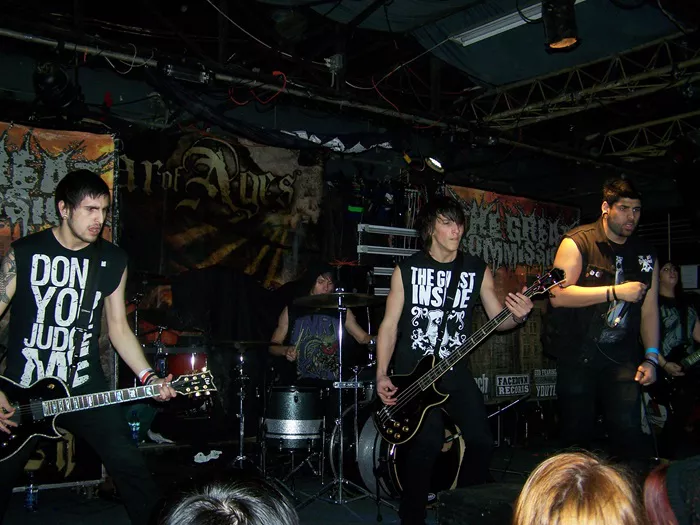In the diverse landscape of heavy metal music, one genre stands out for its unique blend of spirituality and aggression—Christian death metal. This subgenre combines the intense soundscapes and themes of death metal with lyrics and imagery rooted in Christian faith. While some may find the juxtaposition of these elements surprising, Christian death metal has carved out a distinct niche within the metal community, offering listeners a potent mix of musical catharsis and spiritual introspection.
Origins and Evolution
To understand Christian death metal, it’s essential to delve into its origins and evolution. Death metal itself emerged in the 1980s as a subgenre of heavy metal, characterized by its aggressive guitar riffs, growled vocals, and often dark and macabre lyrical themes. Bands like Death, Possessed, and Morbid Angel were among the pioneers of this brutal yet technically intricate style of music.
The infusion of Christian themes into death metal began to take shape in the late 1980s and early 1990s. Bands like Mortification, Deliverance, and Tourniquet were among the first to openly embrace Christian faith while maintaining the sonic intensity of death metal. These bands often addressed themes such as spiritual warfare, redemption, and the struggles of faith within the context of their music.
Musical Characteristics
Christian death metal inherits many of the musical characteristics of traditional death metal. Musically, it is characterized by:
Extreme Vocals: Growled, screamed, or guttural vocals are common in Christian death metal, delivering lyrics with intense fervor.
Technical Instrumentation: Complex guitar riffs, fast drumming, and intricate bass lines are hallmarks of the genre, showcasing musicianship and skill.
Dark Atmosphere: The music often features dark and aggressive tones, creating an atmosphere of intensity and urgency.
Lyricism: While the lyrical themes revolve around Christian faith, they explore topics such as sin, salvation, spiritual warfare, and biblical narratives.
Despite these similarities, Christian death metal distinguishes itself through its lyrical content and thematic focus. Instead of glorifying darkness or nihilism, the lyrics in Christian death metal songs often express themes of hope, perseverance, and the eternal struggle between good and evil from a Christian perspective.
Themes and Messages
Christian death metal tackles a range of thematic elements that reflect the intersection of faith and heavy music. Some common themes include:
Spiritual Warfare: Many songs delve into the concept of spiritual warfare, depicting the battle between light and darkness, good and evil, as understood within Christian theology.
Redemption and Salvation: Lyrics often explore the themes of redemption and salvation, emphasizing the transformative power of faith and divine grace.
Suffering and Perseverance: Songs may address the struggles and suffering encountered on the spiritual journey, highlighting the importance of endurance and resilience.
Biblical Narratives: Christian death metal frequently references biblical narratives, stories, and characters, offering interpretations or reflections through a metal lens.
It’s important to note that while Christian death metal embraces these themes, the interpretations and expressions vary widely among different bands and artists. Some take a more literal approach to biblical narratives, while others use metaphor and symbolism to convey spiritual truths.
Controversies and Challenges
The fusion of Christianity with death metal has not been without its controversies and challenges. Some critics argue that the aggressive and often dark nature of death metal is incompatible with Christian values of peace and love. Additionally, debates have arisen within the Christian community regarding the appropriateness of using extreme music genres to convey religious messages.
Furthermore, the lyrical content of Christian death metal, which can include graphic imagery and themes, has led to discussions about the boundaries of artistic expression within religious contexts. However, proponents of the genre argue that music, including heavy metal, can serve as a platform for exploring deep and complex spiritual themes, reaching audiences that might not otherwise engage with traditional forms of religious expression.
Notable Bands and Albums
Several bands have been instrumental in shaping the landscape of Christian death metal. Some notable bands and albums include:
Mortification – “Scrolls of the Megilloth” (1992): Widely regarded as one of the pioneering albums in Christian death metal, “Scrolls of the Megilloth” combines brutal riffs with overtly Christian lyrics.
Deliverance – “Weapons of Our Warfare” (1990): Deliverance’s second album blends thrash and death metal influences with lyrical themes centered on spiritual warfare and faith.
Tourniquet – “Psycho Surgery” (1991): Known for their technical prowess, Tourniquet’s “Psycho Surgery” delves into themes of mental health, redemption, and biblical imagery.
Living Sacrifice – “Reborn” (1997): This album marked a shift towards a more aggressive sound for Living Sacrifice, exploring themes of transformation and rebirth.
These albums represent just a fraction of the rich discography within the realm of Christian death metal, showcasing the genre’s diversity and evolution over the years.
Impact and Influence
Despite the challenges it has faced, Christian death metal has made a significant impact on both the metal scene and the Christian music industry. It has provided a space for metal musicians to express their faith authentically while pushing the boundaries of musical experimentation and creativity.
Moreover, Christian death metal has garnered a dedicated fanbase, showcasing the diversity of perspectives within the Christian community and highlighting the universal themes of struggle, faith, and redemption that resonate across different cultural and musical contexts.
Conclusion
In conclusion, Christian death metal stands as a testament to the dynamic and multifaceted nature of heavy music. It bridges the gap between faith and fury, offering a platform for musicians to explore deep spiritual themes while delivering a visceral musical experience for listeners.
While controversies and debates may surround the genre, its enduring impact on the metal community and the broader music landscape is undeniable. Christian death metal continues to evolve, incorporating new influences and perspectives while remaining true to its core ethos of blending faith with the raw power of metal music.

